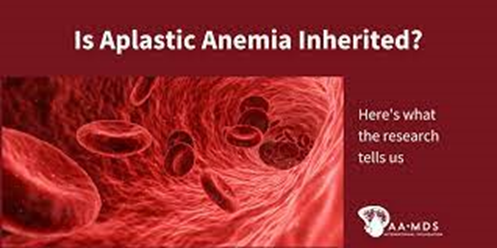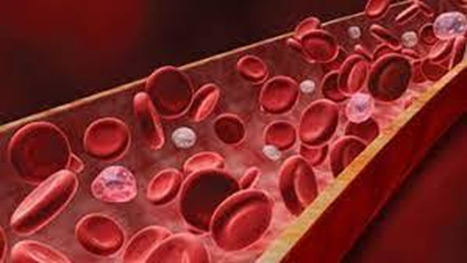Aplastic anemia
Overview
Aplastic anemia is a
condition that occurs when your body stops producing enough new blood cells.
The condition leaves you fatigued and more prone to infections and uncontrolled
bleeding.
A rare and serious condition,
aplastic anemia can develop at any age. It can occur suddenly, or it can come
on slowly and worsen over time. It can be mild or severe.
Treatment for aplastic
anemia might include medications, blood transfusions or a stem cell transplant,
also known as a bone marrow transplant.
Symptoms
Bone marrow
Aplastic anemia can have no
symptoms. When present, signs and symptoms can include:
Fatigue
Shortness of breath
Rapid or irregular heart
rate
Pale skin
Frequent or prolonged
infections
Unexplained or easy bruising
Nosebleeds and bleeding gums
Prolonged bleeding from cuts
Skin rash
Dizziness
Headache
Fever
Aplastic anemia can be
short-lived, or it can become chronic. It can be severe and even fatal.
Causes
Stem cells in the bone
marrow produce blood cells — red cells, white cells and platelets. In aplastic
anemia, stem cells are damaged. As a result, the bone marrow is either empty
(aplastic) or contains few blood cells (hypoplastic).
The most common cause of
aplastic anemia is from your immune system attacking the stem cells in your
bone marrow. Other factors that can injure bone marrow and affect blood cell
production include:
Radiation and
chemotherapy treatments. While these cancer-fighting
therapies kill cancer cells, they can also damage healthy cells, including stem
cells in bone marrow. Aplastic anemia can be a temporary side effect of these
treatments.
Exposure to toxic
chemicals. Toxic chemicals, such as some used in
pesticides and insecticides, and benzene, an ingredient in gasoline, have been
linked to aplastic anemia. This type of anemia might improve if you avoid
repeated exposure to the chemicals that caused your illness.
Use of certain drugs.
Some medications, such as those used to treat rheumatoid arthritis and some
antibiotics, can cause aplastic anemia.
Autoimmune disorders. An
autoimmune disorder, in which your immune system attacks healthy cells, might
involve stem cells in your bone marrow.
A viral infection.
Viral infections that affect bone marrow can play a role in the development of
aplastic anemia. Viruses that have been linked to aplastic anemia include
hepatitis, Epstein-Barr, cytomegalovirus, parvovirus B19 and HIV.
Pregnancy. Your immune
system might attack your bone marrow during pregnancy.
Unknown factors. In many
cases, doctors aren't able to identify the cause of aplastic anemia (idiopathic
aplastic anemia).
Connections with other rare
disorders
Some people with aplastic
anemia also have a rare disorder known as paroxysmal nocturnal hemoglobinuria,
which causes red blood cells to break down too soon. This condition can lead to
aplastic anemia, or aplastic anemia can evolve into paroxysmal nocturnal
hemoglobinuria.
Fanconi's anemia is a rare,
inherited disease that leads to aplastic anemia. Children born with it tend to
be smaller than average and have birth defects, such as underdeveloped limbs.
The disease is diagnosed with the help of blood tests.
Risk factors
Aplastic anemia is rare.
Factors that can increase risk include:
Treatment with high-dose
radiation or chemotherapy for cancer
Exposure to toxic
chemicals
The use of some prescription
drugs — such as chloramphenicol, which is used to treat bacterial infections,
and gold compounds used to treat rheumatoid arthritis
Certain blood diseases,
autoimmune disorders and serious infections
Pregnancy, rarely
Prevention
There's no prevention for
most cases of aplastic anemia. Avoiding exposure to insecticides, herbicides,
organic solvents, paint removers and other toxic chemicals might lower your
risk of the disease.
Jan Ricks Jennings, MHA,
LFACHE
Senior Consultant
Senior Management
Resources, LLC
JanJenningsBlog.Blogspot.com
412.913.0636 Cell
724.733.0509 Office
March 2, 2022




I am from USA. I was suffering from HEPATITIS B for over 3 years, i was hopeless until one of my friend directed me to a herbal DR. Dr Chike on youtube, she said the Dr has herbal medicine that treat HEPATITIS B also said the Dr has helped people with. HERPES, CANCER, DIABETES, HPV, HERPES, HSV 1 .2, Fever, Fibromyalgia, Fatigue and chronic pains. I never believed her but after a lot of talk. I decided to contact him, just few days ago i contacted him and he told me what to do which i did and he sent to me a herbal medicine via {DHL} with prescriptions on how i will take it for a period of days. After i finished taking the medicine for 2 weeks he told me to go for a test which i also did and when the result came out i was surprised to see that i am negative. I am proud to tell you that I am the happiest person on earth. Big thanks to Dr Chike herbs .. I pray you find a solution in him. For more information on how to get treated Contact Dr on, text/call via: +1 (719) 629 0982 WhatsApp . +233502715551, or Facebook page, @ Dr Chike Herbal Remedy.
ReplyDelete